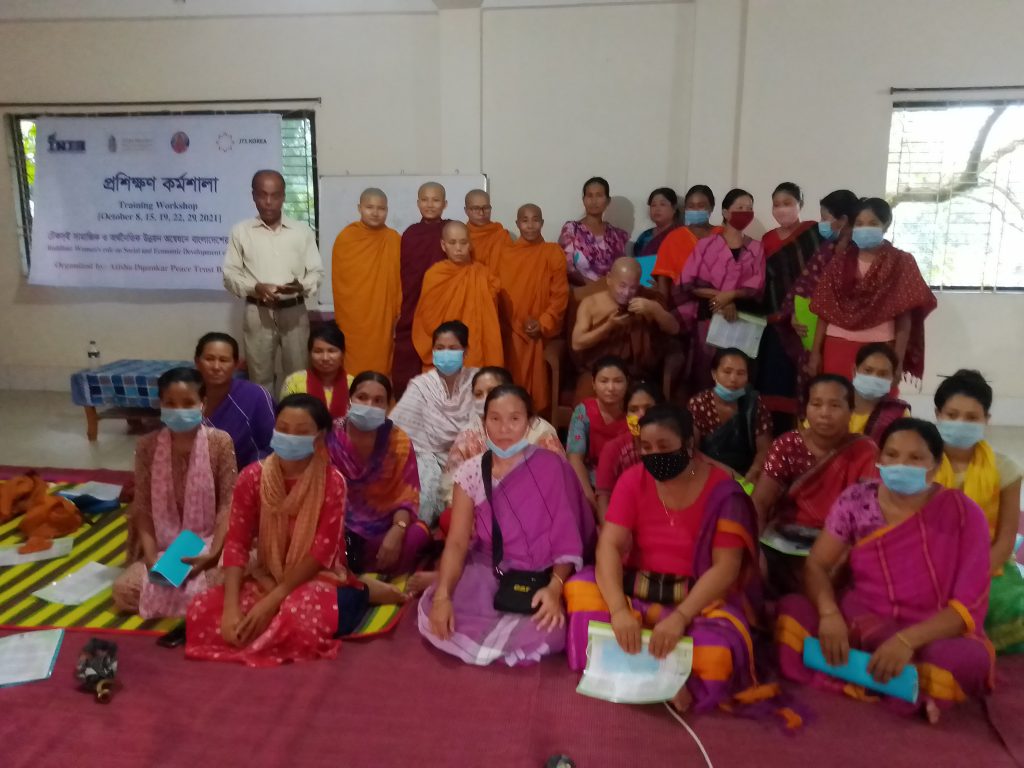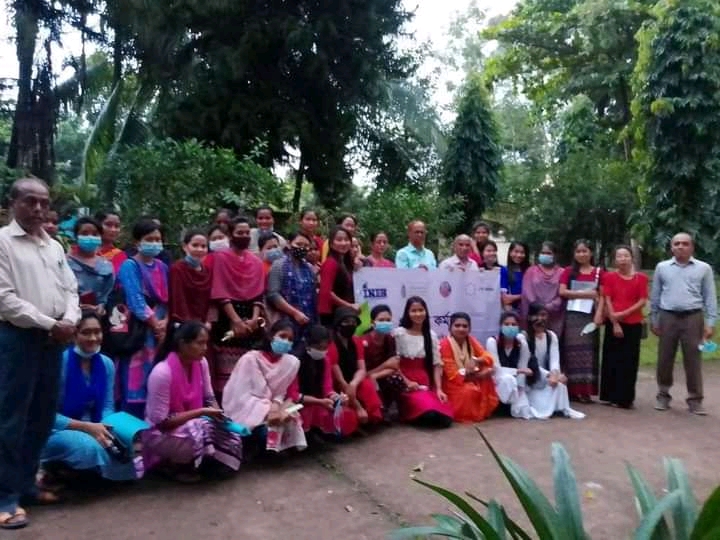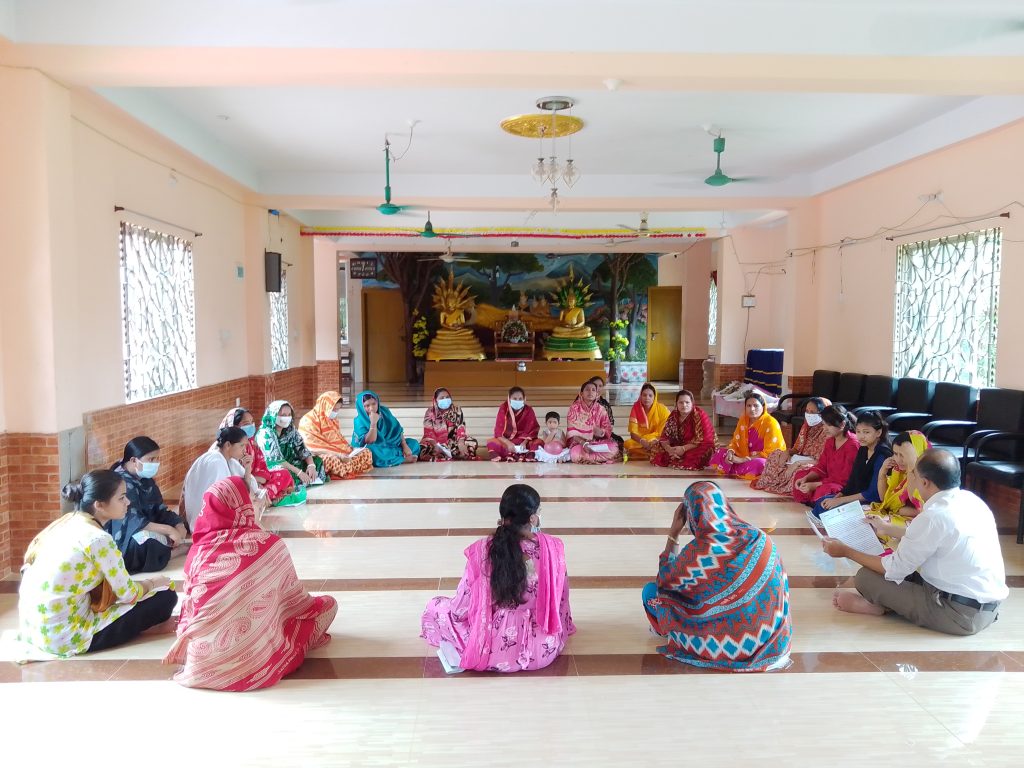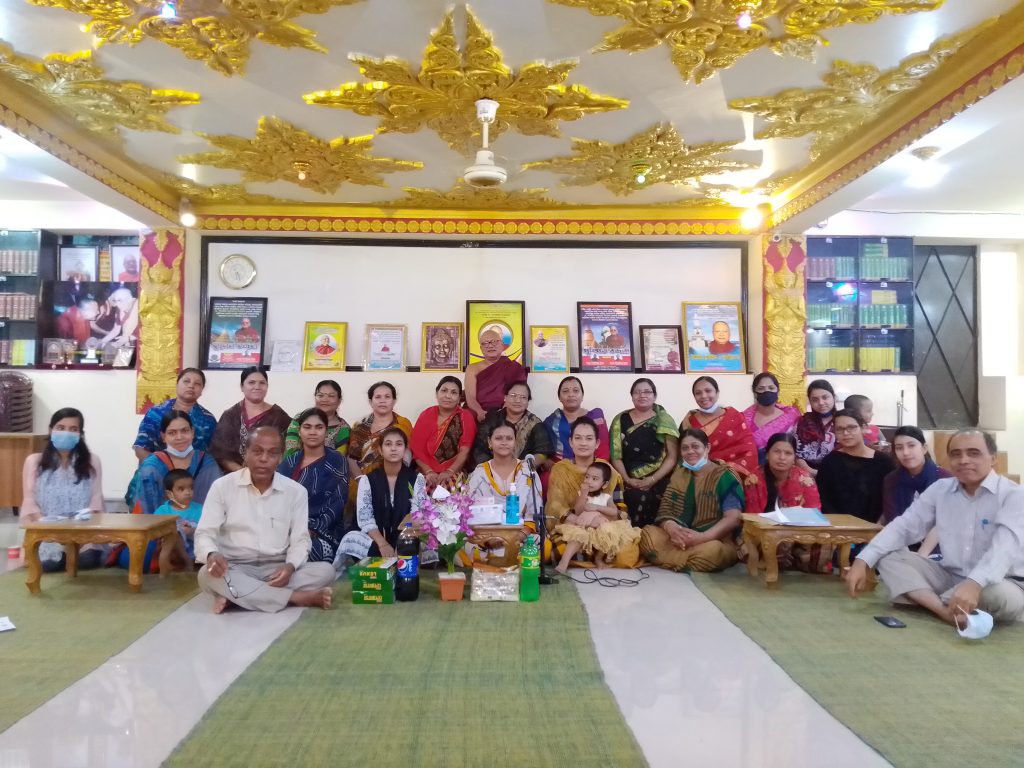



Overview of the initiative:
Atisha Dipankar Peace Trust Bangladesh is glad enough for kindhearted support from the ‘Female Sangha Initiatives for Social Transformation in Southeast Asia’ project leaded by INEB, in partnership with Join Together Society (JTS Korea) for running a project on ‘Buddhist Women’s Leadership and Livelihood Development of Bangladesh’. It is a first time approach for capacity building and leadership development initiatives of the local Buddhist women to fit them in social and economic needs, promote livelihood with equity and dignity, meaningful participation, decision making process, peacebuilding and development policies inclusion. It focused on their needs and made them fit as the diver of hope and inspiration of their respective families and communities, not leave them behind as gender identity and to ensure sustainable livelihood embracing the Lord Buddha’s teaching in the way of life. In Bangladesh women generally contribute more at home and out but are denied basic rights to meet their social and economic needs. In many cases their contribution is not recognised and they get less privilege in access to development issues and fitting them for the current societal needs. In general women are abused with gender based/domestic/social violence, inequalities and oppressions in social and economic life. Sometimes patriarchy, social restrictions, freedom of choice/expression/participation deprived them to qualify in social and economic achievements. The COVID-19 pandemic situation also made it difficult in their everyday life. As a religious minority the Buddhist women are in worse situations in many locations. Buddhists mainly in villages and remote areas live in poverty and are deprived of basic needs to uplight their condition. So, we have targeted poor and remote areas where it is very much needed for developing capacities and make them empowered for fulfilling their social and economic needs, and lead them in sustainable livelihood. We have selected 10 geographic places within 4 districts and targeted 250 promising young, interested women in different Buddhist villages and urban areas in Chattogram (7 spots), Rangamati (1 spot), Cox’s Bazaar(1 spot) and Dhaka (1 spot) districts. Later we changed Cox’s Bazaar, Dhaka replaced Bandharbon, Kharachari districts to add ethnic Buddhist women from different groups. Buddhist women in the CHT districts need more support to overcome the difficulties for lack of proper facilities or support than urban women in Chattogram and Dhaka metropolitan cities. We have initially conducted surveys and dialogues for selecting the participants and their needs for sustainable livelihood. There are 124 from the Barua community, 75 ethnic Chakma, Marma, Tanchanga from CHT ethnic community and 11 Bhikkhuni Sangha from Barua and ethnic communities participated in the project initiative. It is estimated that 250 Buddhist women from 250 households (30% young, 60% mid aged,10% old aged).
We started the project activities from May 2, 2021 . Due to COVID-19 pandemic, the government has implemented a lockdown from April 5 to April 30 and due to high peaks we also were unable to stop the activities from June mid to August 20 . We have to postpone our programs and gatherings due government restrictions on all physical gatherings. We started some project activities and communications in six target locations. The rest four locations are far from us and some are in Chittagong Hill tracts (CHT), where Buddhist women need more project benefits for developing their social and livelihood. In the first step, we have started feasibility study, formal project based discussions and field surveys with participant needs . In all the locations it was very inspiring , especially the eagerness of women’s inclusion in development issues. We arranged a concept note and our project objectives with their desire and social needs. Also have some inspiring quotes from project objects from the INEB and JTS KOREA, specially venerable Pomnyun Sunim contributions for developing the Buddhist women in the Southeast Asian countries. After August 20 we started the Training Workshop in different target locations. And October 30, successfully finished the training workshops, field visitation, project evaluations on contemporary Bangladeshi women and project achievement on uplifting Buddhist women’s social dignity, right based approaches, peace building and developing sustainable livelihood. In short, we consider it as a pilot project and to broaden it’s initiatives in an institutional way for all Bangladeshi women as a center of social innovation for empowering and capacity building of the local and grassroots level women by promoting their meaningful social and economic inclusion, encourage them in social innovation and fit them for building an inclusive society. It is necessary to include the women in social and economic ways for societal peace, sustainability and sustainable national progress of Bangladesh.
Objectives:
The project ‘Buddhist Women’s Leadership and Livelihood Development’ is a new innovative initiative in our Bangladesh Buddhist perspective. We have developed a concept paper for a clear understanding of the project. It is focused on uplifting the status of Buddhist women in organization and community, promoting gender equality, women led entrepreneurship and business management development, local safe food production, advocacy on women’s leadership, gender based violence, peacebuilding, promoting religious pluralism and inclusion in sustainable development. We designed training schedules as 1) Pre-training idea sharing with participants and organizers 2) Survey and interactive dialogue on schedule trainings (outcomes, outputs and impact) 3) Training workshop on ‘Buddhist Women’s role on sustainable social and economic development of Bangladesh’ 4) Training with hands and tools ( Eco Friendly household items production, beautification training, safe food production and sustainable food security promotion, innovative social entrepreneurship and business management development) 5) Field works evaluation 6) Introduction of digital technology and e-commerce as service providers 7) Post training monitoring on self employment and it’s promotion 8) Long term initiatives for collective or individual development by forming cooperative/joint venture for local community development. The project activities are challenging and difficult to implement in the root levels for lack of trained volunteers, expert trainers, smart training curriculum, communication gap , short project duration, limit of funds, formal training center, training materials, stipend etc. Firstly we have started the project activities in full swing. But due to the high pick of COVID situations we faced difficulties in physical gathering, discouragement of participants, lack of cooperation from the local support groups, increased transportation costs. So, it has postponed the activities for more than two months and also rescheduled some programs on field level development project activities and training. But theoretical learning and group work continued successfully. The training workshops were designed to build capacities on the learning fields in very interactive ways.
Challenges and difficulties:
The project activities are very effective for building capacity and empowering our women in social and economic development ways for building sustainable livelihood. Our women are the willing force in home and out. They are closely involved in family and community to implement any sorts of progress or changes. But their roles are limited in meaningful ways and the decision making process at every stage. We are trying to fit them into social changes and interconnect them in every social and economic development way as hope and inspiration of families and community levels. If they are equipped with modern learning and generate them with positive outlooks, they can build a brighter generation with ethical values and wisdom, would play in developing the Buddhist community in sustainable ways and would contribute to national progress. It is difficult to change it in a short term of time, informal ways, lack of project staff, trainers, well equipped learning modules and training lab, technical materials and a particular guideline for long term benefits. In the project time we are faced with more difficulties due to COVID pandemic situation and coordinating with the local participants. It caused panics within the participants in the physical gathering, organizing the 10 project areas which were distances from 25 kms to 170 kms from our organization. Many of the participants were wage workers or engaged in local business. So without economic benefits, it becomes difficult to ensure their participation. For the first time it is challenging to organize just training modules focusing on all level participants, selection of interested participants, suitable project areas, working team, communication and trust building among the root level participants and we are grateful for the support from the Buddhist monks and social activists. We have successfully completed theoretical learnings, not able to complete the technical training in hand and tool, field work evaluations due to COVID situation and lack of voluntary trainers. Technical learnings are very needed in most project areas, the participants also desired most but it needs more technical hands, financial support and a long term approach for better achievement.
Specific results (Outputs, Outcomes, Impact):
Activity 1: Pre-training idea sharing
Outputs: The participants are well acknowledged on Buddhist value based sustainable women empowerment project activities
Outcomes: Highly motivated and encouraged to participate
Impact: Positive changes in value based social engagement
Activity 2: Survey and interactive dialogue
Outputs: Found out possibilities and problems on the Buddhist women development
Outcomes: Innovative idea generated for training learning fields
Impact: Realistic learning tools are selected for sustainable women development
Activity 3: Training workshop ‘Buddhist women’s role on sustainable social and economic development of Bangladesh’
Outputs: The participants are well defined with value based women empowerment issues on social, economic, environment and human right based approaches for sustainable livelihood, community and national development
Outcomes: Encouraged and improved the capacities on sustainable livelihood and community development issues
Impacts: Would play as the driver of hope and inspiration-working on dignified better livelihood and sustainable societal changes from family to state levels
Activity 4: Training with hands and tools [motivated only]
Outputs: Connected with importance on eco-friendly household product and safe healthy food production, beautification training and innovative social entrepreneurship and business management development for sustainable livelihood
Outcomes: Got interested to work as entrepreneur rather than service holder
Impacts: Would play as change makers in local economics
Activity 5: Fields works evaluation [not full completed]
Outputs: Inspired to sharpen their meaningful contribution in daily life
Outcomes: Applying sustainable development policies for better livelihood
Impacts: Would bring long term positive changes in social and development ways
Activity 6: Post training monitoring [not full completed]
Outputs: Making connection with the innovative economic development ways
Outcomes: Would lead right livelihoods and mindful ways of life
Impacts: Social peace and economic sustainability would prevail in the society
Activity 7: Long term approaches [continues]
Outputs: Local Buddhist women would play as actors on social/economic development ways and achieve change maker’s attitude for social innovation.
Outcomes: Would play as leaders in decision making and implementation process in social and development ways
Impacts: The trained up Buddhist women will play positive roles in sustainable community building and continue their efforts for nation development and overall achievements.
Observations:
1)Social attitudes- Women in Bangladesh generally take care of their families. Employed women earn money and do all family work. In the Buddhist community, they contribute to the propagation of Buddhism and rituals. But their contributions are not recognised in many ways, some of the participants said. Some of them mentioned, the community doesn’t admit their roles and responsibilities in meaningful ways. They added, there are no action oriented roles in uplifting status and dignity of the local Buddhist women or other community levels also. The participants expressed satisfaction for adding them in the Buddhist women’s development project activities and changing their mental attitudes in meaningful participation in every social issue, in the decision making process. They got confidence as the driver of hope and inspiration, as change makers, overcoming gender based discrimination or social patriarchacy. They also expressed satisfaction in participating in social rights based approaches,mentioning the importance of their contribution in the community and the need for empowerment in meaningful social inclusion for sustainable community and local development.
2)Economic value– the participants realized their economic contribution is less than men but sometimes bigger than men. Once they are treated as caretaker of the families but in some ways considered as the willing forces in economic development ways. They mentioned that we inspire them and make them fit to contribute to the local economy by generating business, entrepreneurship, and productive ways rather than service providers.
3)Environmental ethics- One of the most important topics is to build awareness on conservation of our surrounding nature and environment following the Buddha’s teaching. Generating loving-kindness to all beings and non-living nature, use of eco-friendly products, ethical consumerism for low carbon emission, keep the mother earth a liveable place for all living beings. Every participant got inspired and committed in keeping their contribution for saving the earth from unethical greed, lust and consumerism.
4)Human right based approaches- The participants mentioned, they have little knowledge on basic human/constitutional rights, Govt Women development policy-2011, universal declaration on human rights, CEDAW, UNSDGs. We gave them a light understanding on the women’s rights based approaches and importance of all men and women participation for building an equitable, discrimination free, dignified society. They expressed their satisfaction for including them in the right based approaches and making them a general understanding on these important issues.
Overall observations and recommendations:
- It needs an equitable opportunity to develop Buddhist women as human resources in social and economic ways. We have conducted basic theoretical learnings on women empowerment. Now, it needs technical/practical learnings for them to implement it in field levels for social and economic benefits.
- Our Buddhist women are interested in engaging in social innovation by promoting their latent talents by developing entrepreneurship or promoting business rather than as job holders.
- It needs women’s leadership development for meaningful participation and decision making process in every stage from family to national life.
- It is essential to change positive approaches for adding more women’s participation in sustainable peacebuilding, conflict resolutions, disaster management, humanitarian services etc
- Well equiped technical/quality education and meaningful social engagement can reduce gender based violence and discrimination within women of Bangladesh
- It needs long term approaches to change men’s outlook and social attitudes for uplifting women’s equal rights and dignity in all levels.
Now, we plan to implement some findings in an institutional way by forming a center of social innovation. It is important to set up a social innovative training centre for our Buddhist women in promoting women led entrepreneurship, developing business management and empowering them in productive ways . We do hope it would be possible to skill up one thousand Buddhist women to make them fit for right livelihoods embracing the Lord Buddha’s noble eightfold within the next two years and after that time we are hopeful to implement the proposed initiatives within our large women community. It would be a Buddhist based effort for our women of Bangladesh to add them to productive ways and develop their leadership to lead positive changes. We emphasize on sammak gibhika/right livelihood as the first priority, as we are not able to ensure better life, we will not ensure our societal peace and a strong community to sustain in the 21th century. We hope INEB and JTS Korea will extend their generous support for the next project.

0 Comments